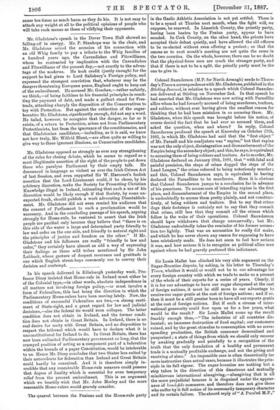Mr. Gladstone opposed as strongly as ever any strengthening of
the rules for closing debate, which he seems to regard as a most illegitimate assertion of the right of the people to put down those who paralyse Parliament by their empty talk. He denounced in language as violent as ever the Irish Crimes Act of last Session, and even supported Sir W. Harcourt's foolish assertion that the Lord-Lieutenant could, if he chose, by his arbitrary discretion, make the Society for Promoting Christian Knowledge illegal in Ireland, intimating that such a use of his discretion would be likely enough if that Society, by some un- expected freak, should publish a work advocating Disestablish- meat. Mr. Gladstone did not even remind his audience that the consent of Parliament to such a proclamation would be necessary. And in the concluding passage of his speech, arguing strongly for Home-rule, he ventured to assert that the Irish people are pacified only because they believe that "there is on this side of the water a large and determined party friendly to law and order on the one side, and friendly to natural right and the principles of justice and freedom on the other." If Mr. Gladstone and his followers are really "friendly to law and order," they certainly have almost as odd a way of expressing their feelings as those wild tribes mentioned by Sir John Lubbock, whose gesture of deepest reverence and gratitude is one which English street-boys commonly use to convey their derision and contempt.






































 Previous page
Previous page